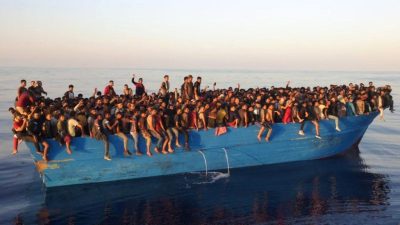Crisis of the Wheat Export Supply Chain: EU Sanctions against Russia Could Trigger an African-Middle Eastern Migrant Crisis

All Global Research articles can be read in 51 languages by activating the “Translate Website” drop down menu on the top banner of our home page (Desktop version).
To receive Global Research’s Daily Newsletter (selected articles), click here.
Follow us on Instagram and Twitter and subscribe to our Telegram Channel. Feel free to repost and share widely Global Research articles.
***
Africa and the Middle East is set to suffer more than Europe if there is a reduction of grain exports, according to the head of the Belgian federation of cereal traders and agrosupply (FEGRA), Gisele Fichefet. Her comment was said in response to Russian Agriculture Minister Dmitry Patrushev’s August 5 warning that 50 million tonnes of grain might be forced off the market because this year’s crops did not reach the 130 million tonne target.
“I don’t expect major problems in Europe in both categories of grain, for cattle breeding and for human consumption, since this year’s crops were excellent despite the drought at the end of the season. The problems, if they arise, will be in the Middle East and Africa, and maybe in some countries of Southeast Asia,” Fichefet said.
Russia, the world’s largest exporter of wheat, and Ukraine, the fifth largest exporter of the same product, collectively account for more than one-third of global cereal exports and a half of the world’s sunflower oil export market. In addition, UN Food and Agriculture Organization (FAO) data found that Russia was the number one exporter of nitrogen fertilisers in 2021, and many European and Central Asian countries rely on Russia for over 50% of their fertilizer supply.
FAO predicted in March that supply disruptions in Russia and Ukraine could affect up to 30% of the wheat supply in some 50 countries, many of them being low-income countries in Africa, the Middle East and Southeast Asia.
Fichefet believes it was “not so much a price problem, as a delivery issue” as price fluctuations had not been more than 20% up or down since the start of the Ukrainian conflict. Although prices stabilised following the UN-brokered deal between Russia, Ukraine and Turkey, Fichefet warned this scenario could change if Moscow cuts grain exports.
On July 22, Russia, Turkey and the UN signed an agreement that unblocked Ukraine’s grain and fertiliser exports amid hostilities. Representatives of the Ukrainian government signed a similar document with Ankara and UN representatives.
In addition, Russia signed a memorandum with the UN to contribute to the export of Russian fertilisers and agricultural products to international markets. UN Secretary General António Guterres, meanwhile, announced the creation of the joint coordination centre to ensure the safety of bulk carriers transporting grain from Ukrainian ports, such as Odessa.
The eventual release of funds from Russian banks frozen by the sanctions against Moscow for its operation in Ukraine could help stop a potential food crisis being instigated by the shortage of agricultural products. Although Fichefet believes Europe is mostly protected from a potential food crisis, a destabilised global situation can become unsustainable for Europe.
On July 19, the European Commission proposed to unblock some of the funds in Russian banks to resume trade in agricultural and food products. The sanctions against Moscow caused the global rise in the prices of oil, gas and fertilisers. This has not only had a negative impact on Russia, but also the US and EU.
There has been a boomerang effect from the sanctions imposed by the West, specifically on the EU, which are the ones now suffering the most. Alarmingly though, the EU never considered that its measures against Russia could also lead to famine and a subsequent migration crisis in African and Middle Eastern countries. Europe since 2015 has already experienced a migration crisis due to all the conflicts that the US started in the Middle East and Africa, including Libya, by wanting to change the region geopolitically.
Egypt is already one of the world’s top wheat importers, buying around 75% of its supply from Ukraine and Russia. The war in Ukraine has seen wheat prices in Egypt soar, prompting President Abdel Fattah el Sisi to urge the government to determine a fixed price for unsubsidised bread, which started at the end of March.
In a speech on May 21, Sisi referred to the Quran’s Surah Yusuf about the necessity to “store up wheat for famine”, drawing a parallel between the present crisis to the famine during Prophet Joseph’s time. He also urged Egyptians to prioritise wheat planting rather than wasting this resource.
Cairo is also concerned by the Grand Ethiopian Renaissance Dam being constructed on the Blue Nile River. This project has received huge opposition from Egypt and Sudan as it could impact farmland downstream and instigate a drought. Such a scenario will not only increase internal pressures in Egypt, but coupled with simultaneous crises across Africa, the country could become a transit point for migrants attempting to reach Europe.
Therefore, although the EU may feel comfortable by its own supply of grains, it risks instigating another migration crisis by continuing with reckless sanctions against Russia that significantly affects African and Middle Eastern countries from securing grain.
*
Note to readers: Please click the share buttons above or below. Follow us on Instagram and Twitter and subscribe to our Telegram Channel. Feel free to repost and share widely Global Research articles.
Ahmed Adel is a Cairo-based geopolitics and political economy researcher.
Featured image is from InfoBrics

